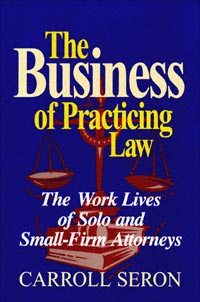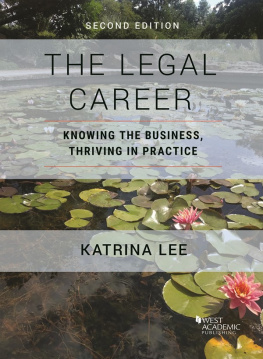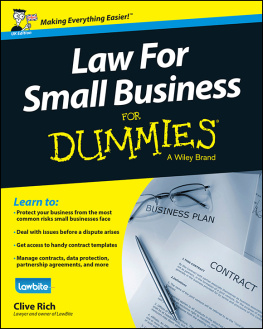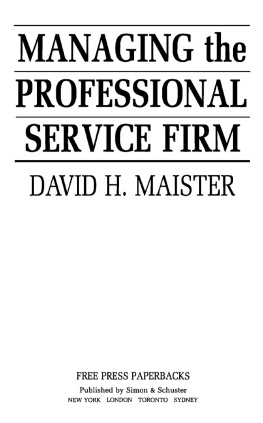Cover

| title | : | The Business of Practicing Law : The Work Lives of Solo and Small-firm Attorneys Labor and Social Change |
| author | : | Seron, Carroll. |
| publisher | : | Temple University Press |
| isbn10 | asin | : | 1566394074 |
| print isbn13 | : | 9781566394079 |
| ebook isbn13 | : | 9780585377438 |
| language | : | English |
| subject | Practice of law--United States, Law offices--United States, Lawyers--United States. |
| publication date | : | 1996 |
| lcc | : | KF318.S47 1996eb |
| ddc | : | 340/.068 |
| subject | : | Practice of law--United States, Law offices--United States, Lawyers--United States. |
Page i
THE BUSINESS OF PRACTICING LAWPage ii
In the series Labor and Social Change,
edited by Paula Rayman and Carmen Sirianni
Page iii
THE BUSINESS OF PRACTICING LAW
The Work Lives of Solo and Small-Firm Attorneys
Carroll Seron

Page iv
Temple University Press, Philadelphia 19122
Copyright 1996 by Temple University. All rights reserved
Published 1996
Printed in the United States of America
 The paper used in this book meets the requirements of the American National Standard for Information SciencesPermanence of Paper for Printed Library Materials, ANSI Z39.48-1984
The paper used in this book meets the requirements of the American National Standard for Information SciencesPermanence of Paper for Printed Library Materials, ANSI Z39.48-1984
Text design by Nighthawk Design
Library of Congress Cataloging-in-Publication Data
Seron, Carroll.
The business of practicing law: the work lives of solo and small
firm attorneys / Carroll Seron.
p. cm.(Labor and social change)
Includes bibliographical references and index.
ISBN 1-56639-406-6 (cloth: alk. paper).ISBN 1-56639-407-4 (pbk. :alk. paper)
1. Practice of lawUnited States. 2. Law officesUnited States.
3. LawyersUnited States. I. Title. II. Series.
KF318.S47 1996
340'.068dc20 95-561
Chapter 3: Seron, Carroll, and Kerry Ferris. Negotiating Professionalism: The Gendered Social Capital of Flexible Time, Work and Occupations 22(1): 2248, copyright 1995 by Sage Publications. Portions of this article are reprinted by permission of Sage Publications, Inc.
Page v
In memory of my father, Arthur Seron
Page vii
Contents
| Preface | ix |
|
| Acknowledgments | xiii |
|
Chapter 1
Professionalism versus Commercialism | 1 |
|
Chapter 2
The Terrains of Postindustrialization | 19 |
|
Chapter 3
Negotiating Time | 31 |
|
Chapter 4
Getting Clients | 48 |
|
Chapter 5
Organizing Practices | 67 |
|
Chapter 6
The Managing-Marketing End | 86 |
|
Chapter 7
Serving Clients and Consumers | 106 |
|
Chapter 8
Serving the Public | 127 |
|
Chapter 9
The Social Patterns of Private Professional Practice | 137 |
|
| Appendix: The Design of the Study | 151 |
|
Page viii
| Notes | 161 |
|
| Cases Cited | 199 |
|
| References | 201 |
|
| Index | 213 |
Page ix
Preface
Denise Dewey (not her real name) is a successful personal injury attorney with a long list of well-known cases. She works on her own in lower Manhattan in a more businesslike manner than one traditionally associates with a professional practice. Dewey has systematized all her legal work and linked it to her support staff. She speculates that her newly installed computer network should greatly improve the efficiency and productivity of her legal business. She has plans to work out a design with a computer consultant to connect her office to both her Manhattan home and her country home. She intends to expand her production and reputation through more computerization and advertising. She is developing a video about her legal work for presentation to women's groups, and she expects to hire a public relations person to expand the news coverage of her cases and coordinate her marketing plan. When asked about her work with clients, Dewey explains that serving clients is actually a matter of selling consumers on what kind of legal assistance they need. She and her entrepreneurial colleagues are creating legal businesses premised on marketing, automating, and merchandising services.
Dewey's situation illustrates that success as a professional continues to require much more than a nine-to-five commitment. It also reflects the relationship to gender of the demands of professionalism: Her husband does a majority of the chores for her and her children at home so that she can work professional overtime. This kind of support sets her apart from many female lawyers, who must cope by other means with the time demands of their practice.
This book looks at (1) the ways in which solo and small-firm lawyers in the New York metropolitan area solve the problems of getting business, organizing work, and serving clients in the presence of an increasingly accommodating boundary between professionalism and commercialism; (2) the expansion of a service-based, postindustrial economy;
Page x
and (3) the need to negotiate time in light of the gender shift in the composition of the professional labor force.
All service occupations must get enough business, organize delivery cost-effectively, and serve clients efficiently. Professionals offer a somewhat special case, however, because of the rules by which their tasks are guided. To get business, lawyers are encouraged to wait for clients to call and to become known by cultivating social networks through family, friends, religious organizations, and other associations. To organize their practices, lawyers are encouraged to follow a collegial model and make decisions collectively in order to ensure equity and fairness among professional partners. To serve clients, lawyers are guided by an ethic of quality treatment, which assumes that they will devote whatever time is needed to each case and will treat each client as special, if not unique. And to serve the public interest, lawyers are urged to volunteer their time through pro bono activities.
Next page









 The paper used in this book meets the requirements of the American National Standard for Information SciencesPermanence of Paper for Printed Library Materials, ANSI Z39.48-1984
The paper used in this book meets the requirements of the American National Standard for Information SciencesPermanence of Paper for Printed Library Materials, ANSI Z39.48-1984